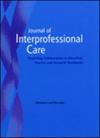痴呆症姑息治疗中的跨专业合作。
IF 1.9
3区 医学
Q3 HEALTH CARE SCIENCES & SERVICES
引用次数: 0
摘要
专业间合作(IPC)对于为痴呆症患者提供高质量的姑息关怀(PC)至关重要。本范围综述旨在确定痴呆症姑息关怀中的 IPC 方法,并探索构成这些方法的要素。我们使用乔安娜-布里格斯研究所审稿人手册和 PRISMA 指南在 PubMed、CINAHL 和 PsychINFO 中进行了检索,并对纳入的文章进行了内容分析。共纳入 28 篇文章,其中描述了 16 种用于姑息痴呆症护理的 IPC 方法。内容分析揭示了这些方法的三个总体要素:1)合作主题;2)合作流程;3)促进合作的资源。经常报告的合作主题包括疼痛管理和提供临终关怀。这些主题是通过相互交织的合作过程来解决的,包括沟通、协调、评估和监控以及反思和评估。为确保在姑息痴呆症护理中实现最佳的 IPC,需要各种资源,如 PC 知识、控制症状的技能、与合作者沟通的技能以及有利的环境。总之,已确定的姑息痴呆症照护中的IPC方法涉及不同的合作专业人员,他们主要是管理症状、为临终阶段做准备,并需要物质和非物质资源,以实现姑息痴呆症照护中的最佳IPC。本文章由计算机程序翻译,如有差异,请以英文原文为准。
Interprofessional collaboration in palliative dementia care.
Interprofessional collaboration (IPC) is essential for high-quality palliative care (PC) for persons with dementia. The aim of this scoping review was to identify IPC approaches in palliative dementia care and explore the elements constituting these approaches. We performed a search in PubMed, CINAHL, and PsychINFO using the Joanna Briggs Institute Reviewers' manual and PRISMA guidelines, and conducted content analysis of the included articles. In total, 28 articles were included, which described 16 IPC approaches in palliative dementia care. The content analysis revealed three overall elements of these approaches: 1) collaborative themes, 2) collaborative processes, and 3) resources facilitating collaboration. Frequently reported collaborative themes embraced pain management and providing care in the dying phase. These themes were addressed through intertwined collaborative processes including communication, coordination, assessing and monitoring, and reflecting and evaluating. To ensure optimal IPC in palliative dementia care, various resources were required, such as PC knowledge, skills to manage symptoms, skills to communicate with collaborators, and a facilitating environment. In conclusion, the identified IPC approaches in palliative dementia care involve diverse collaborating professionals who mainly manage symptoms, prepare for the dying phase and require material and immaterial resources to enable optimal IPC in palliative dementia care.
求助全文
通过发布文献求助,成功后即可免费获取论文全文。
去求助
来源期刊

Journal of Interprofessional Care
HEALTH CARE SCIENCES & SERVICES-
CiteScore
5.80
自引率
14.80%
发文量
124
审稿时长
6-12 weeks
期刊介绍:
The Journal of Interprofessional Care disseminates research and new developments in the field of interprofessional education and practice. We welcome contributions containing an explicit interprofessional focus, and involving a range of settings, professions, and fields. Areas of practice covered include primary, community and hospital care, health education and public health, and beyond health and social care into fields such as criminal justice and primary/elementary education. Papers introducing additional interprofessional views, for example, from a community development or environmental design perspective, are welcome. The Journal is disseminated internationally and encourages submissions from around the world.
 求助内容:
求助内容: 应助结果提醒方式:
应助结果提醒方式:


